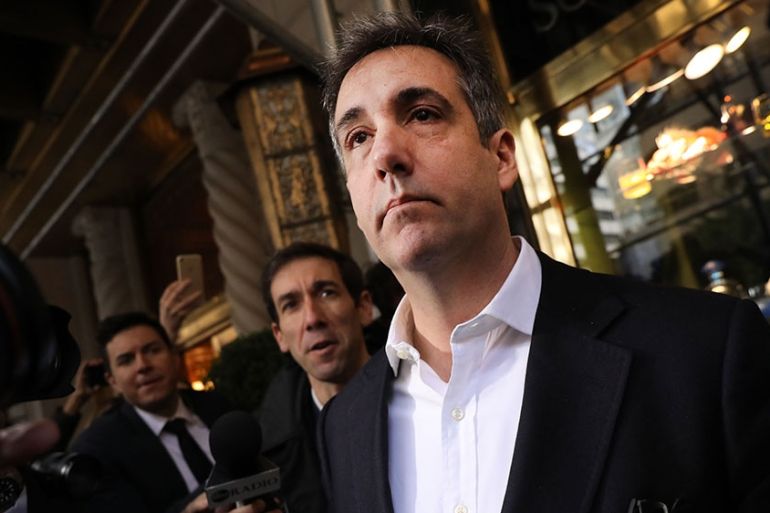Documents reveal Trump discussed quashing stories about affairs
Documents shed new light on Trump’s role as his campaign scrambled to respond to inquires about hush-money payments.

Documents released by a judge’s order on Thursday detailed a flurry of communications involving US President Donald Trump, his campaign team and former personal lawyer Michael Cohen to engineer hush-money payments to an adult film actress who said she had a sexual encounter with the president shortly before the 2016 election.
United States District Judge William Pauley in Manhattan on Wednesday had ordered that the material, used by prosecutors to obtain a 2018 search warrant for Cohen’s home and office, be unsealed on Thursday morning. The judge found there was no reason to keep the documents secret after prosecutors told him that their investigation into the payments had ended.
Keep reading
list of 4 itemsTrump faces Supreme Court immunity test as ‘hush money’ trial continues
Five takeaways from day two of Trump’s New York hush money trial testimony
‘Catch and kill’ scheme takes centre stage at Trump hush-money trial
Cohen, 52, pleaded guilty in August 2018 to violating campaign finance law by directing payments of $130,000 to adult film star Stormy Daniels and $150,000 to Playboy model Karen McDougal to avert a scandal shortly before the 2016 presidential election. Both women have said they had sexual encounters with Trump more than a decade ago and that the money was meant to buy their silence. Trump has denied the encounters and, in 2018, told reporters he knew nothing about a payment to Daniels.
The search warrant application described a phone call on October 8, 2016, about a month before the election, involving Trump, Cohen and Hope Hicks, then the press secretary for Trump’s presidential campaign, which prosecutors believed was to discuss paying to squash public reports of an affair between Trump and Daniels.
A few minutes after that call, Cohen called David Pecker, the president of American Media Inc who was close to Trump, and then received a call from another employee at AMI, which published the National Enquirer tabloid newspaper. A short time later, Cohen called Hicks back for about two minutes. Calls between the Trump campaign, AMI and Cohen continued through the evening.
Prosecutors said these calls were to discuss getting a payment to Keith Davidson, then a lawyer for Daniels.
On October 17, 2016, Cohen was involved in calls and texts as he feared the attempted settlement agreement might fall apart, according to the warrant application.
Continued negotiations
The documents indicated that Dylan Howard, chief content officer at AMI, believed Daniels might be trying to sell her story to a news outlet after all.
“I’m told they’re going with DailyMail,” Howard wrote in a text to Cohen late that afternoon, referring to a British tabloid. “Are you aware?” The pair quickly got on the phone. Cohen tried to call Trump but appears to have been unsuccessful, the documents showed.
The negotiations continued with Cohen communicating multiple times on October 26 with Daniels’s lawyer and the two AMI executives, Pecker and Howard, the documents showed.
The following morning Cohen called Trump and spoke with him for about three minutes, and then soon after made a second call for about 90 seconds to Trump, the documents showed. Less than 30 minutes later, Cohen sent emails to a person who had set up the limited liability companies through which the payment funds were handled, asking that he be sent “the filing receipt” as soon as possible, the documents showed.
After meeting with a bank representative from First Republic Bank at Trump Tower that day, Cohen transferred $131,000 out of a home equity line of credit that Cohen had at First Republic, which prosecutors said was used to pay Daniels.
Prosecutors had previously asked the records remain sealed because they were still probing the payments.
The US Attorney’s Office in Manhattan declined to comment. But its closure of the investigation strongly suggests prosecutors will not bring criminal charges against anyone besides Cohen, who pleaded guilty last year to campaign finance violations, lying to Congress and financial crimes. He began serving a three-year prison sentence in May.
Cohen remains the only person to be charged in the scheme to protect Trump’s reputation during the 2016 presidential campaign. But prosecutors implicated Trump in court filings, saying he directed Cohen to arrange the hush-money payments. The president has denied wrongdoing.
A lawyer for Cohen, Lanny Davis, has argued that others in Trump’s orbit should have been indicted, and that prosecutors owe the public an explanation for why they were not. Cohen in February told Congress that a Trump Organization executive, Allen Weisselberg, and Trump’s son, Donald Jr, were involved in reimbursing him for one of the hush-money payments.
“The Southern District of New York was disproportionate in the sentence it asked for and appears to have targeted just Michael Cohen for reasons that I can’t understand,” Davis told The Associated Press in an interview earlier this year.
The White House did not immediately respond to a request from Reuters News Agency for comment on the released documents.
Representative Adam Schiff, the Democratic chair of the House Intelligence Committee, said that “contrary to [Trump’s] public statement” the documents show that “he authorised the illegal payment of hush money, and coordinated doing so with his attorney Cohen, and his press secretary, Hope Hicks”.
Schiff added, “The inescapable conclusion from all the public materials available now is that there was ample evidence to charge Donald Trump with the same criminal election law violations for which Michael Cohen pleaded guilty … We’re Individual-1 not protected by the DOJ opinion prohibiting the indictment of a sitting president, he would be criminally charged as Cohen’s co-conspirator.”